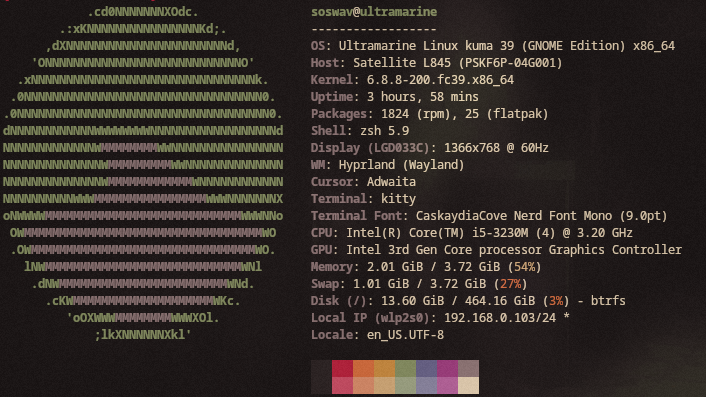Since I like FreeBSD so much on my server I installed it on my crappy unstable laptop as well. I only use it for browsing, editing notes and video conferencing when working from home, so I need no complex setup.
From top to bottom:
- Output of
fastfetch, an openneovimand my wallpaper switcher. The bar iseww. - A second workspace with Firefox and my notes.
- My “logout window”. Pressing a key combo will show this overlay with the option to close it or pick shutdown/reboot/logout.
Not pictured is fuzzel for running applications.
A few minor things still need to be done but nothing major will change.
I don’t see enough people running BSD as a full desktop system. You seems to be experienced with this. I am trying to get into BSD, but am experienced in Linux.
How’s your setup faring in your day to day operations?
I don’t see enough people running BSD as a full desktop system. You seems to be experienced with this. I am trying to get into BSD, but am experienced in Linux.
I like BSD a lot but on the desktop Linux gives you much more options and a smooth experience. I’ve read that at BSD conferences BSD developers bring their Mac books with the original Apple OS on it so go figure. Here’s some reading material :
Yeah, I’ve been hearing pretty much that. Didn’t know about the Macs in the BSD conference tho. I guess it makes sense since the underlying stuff are really similar.
I’m currently daily-driving various Linux systems, with and without the DE, so I can vouch for that smooth desktop experience!
For the few tasks I use this system it works about as well as when I had Linux on it. I mostly use the browser and terminal anyway, so those are pretty basic requirements. Video conferencing for my job is via WebEx, which has no working app for BSD so I have to use Chomium for that (their H264 plugin won’t work on Firefox in BSD). Launching their website in Chromium vs using their electron app on linux makes no big difference to me in the end of the day, though. Camera and microphone work fine.
Depending on your personal needs, however, BSD may not fulfill all of them. I think that if you want a state of the art desktop experience, BSD is not the way to go. Software can be a bit behind compared to Linux. Plasma 6, for example, is not ready for daily use yet. Xorg still is the stable way to go, I feel. Also, electron applications are not available in the package repository, so if you want to use those you will have to build them yourself. There usually are ports available though, so you can easily build them, but it will take a while. Other software will simply not build. The official Hyprland plugins for example rely on a build flag that is not available in the compiler BSD uses (if I read that correcly), so no additional plugins for this guy.
If you could summarise your system usage to, for example, using a full KDE Plasma 5 desktop, browser, office suite and playing some multimedia, there is no reason a BSD desktop could not work for you. It does become noticable how many electron-based applications are popularised nowadays, though, so you may need to look into alternatives for some applications you use. I chose Hyprland because I hate touchpads (or this touchpad specifically) and wanted to use it as little as possible… :-) I tested KDE though, and it worked perfectly.
If you want to try out FreeBSD as a desktop system and you have an adequately sized USB stick (f.e. 8GB or more), I would recommend trying out NomadBSD. It can be installed on a USB stick and you can use it as a full fledged OS; all packages are installed on the USB stick. It’s not fast, because USB, but that’s how I checked if all the hardware in this crappy laptop (it really is crappy and unstable, on all OS’es) worked with BSD.
At the end of the day I have a soft spot for BSD so I tend to ignore some of the downsides that come with when not used as a server. My main desktop and the PC connected to my television both run Linux, for example. BSD I use on my server, router and now this laptop.
Damn, you’re using this for work? From what I’ve read/heard the terminal stuff are actually quite solid, so I guess it makes sense if all you do involve mainly vim, coreutils, ssh, and browsers.
I’m planning on setting a FreeBSD or OpenBSD for tiny hime server.
Also, webex sucks.
In a work context only for video meetings. When working remote I use my Linux desktop which lacks a webcam and microphone. Also, we use the Cisco ICAClient to work remote and I doubt that would work on a BSD system anyway.
Dutch looks like a meme version of English.
I just tried FreeBSD on my laptop. It was a blast from the past, like Linux 15 years ago.
I had to disable the fingerprint reader in BIOS to get rid of error messages spamming TTY1 that covered the installer menu, compile a custom kernel to make battery management work, and WiFi speed was capped at 6 MBit.
Netflix didn’t work, Signal wasn’t available, KDE’s Wayland session hung at login, suspend didn’t work, screen brightness keys and media keys didn’t work.
Unfortunately I downloaded the wrong branch of SRC to compile the kernel (that way I learned that STABLE is a development branch) and was unable to update the system afterwards.All of which are problems that have a fix (often through a Linux compatibility layer or reading a LOT) but Debian is right there, and works out of the box.
is the last picture a lockscreen? looks so cool!
Not a lock screen per se. I did not like the idea of having logout/reboot/shutdown buttons in the status bar since I don’t want to click them by mistake, so I made a key combo (Meta+Del) which shows this custom screen with the mentioned options in the bottom right. As for the image, it is a darkened version of this one.
Do you have a link to the bottom wallpaper?
The original is on pixiv but you can also find it on yande.re. On the screenshot it has a transparent layer of black covering it to make it darker.
Would you mind sharing your eww dots? I also use eww for a bar. Curious to see others’ eww solutions. 😊
Not at all, I still had to store the stuff in git anyway. Here you go: https://github.com/lindely/laptop
Thank you kindly. Cool, I see we had about the same solution of handling workspaces and their switching, conceptually.
I use this bash script, currently:
#!/bin/bash print_workspaces() { i3-msg -t get_workspaces \ | jq -c 'map({num,name,visible,focused,urgent,empty:false}) + ([range(1;11)] | map({num:.,name:.,visible:false,focused:false,urgent:false,empty:true})) | unique_by(.num)' } print_workspaces if [ "$1" = subscribe ] then i3-msg -m -t subscribe '["workspace"]' | \ while read do print_workspaces done fiI also want to print numbers for workspaces that don’t exist (yet) so that there’s more consistency in the bar numbers. I guess I’m getting old…
Not being able to print unused workspaces is just a weird thing for me as well, but I’m also someone who would be called “old” by certain age groups. I have never used i3 so I wouldn’t know how to achieve that there…
I achieve it with my script above. I conceptually just pad the gaps in the existing workspace data with the missing workspaces and add some extra data to tell eww which workspaces are “real” and which are non-existent/empty.
“crappy laptop” has a ryzen 2500u
Here I am with a decent intel core i5 5200u
If your laptop would randomly lock up when watching YouTube videos, you would probably refer to it as crappy too 😉 .
My laptops keyboard is busted and it’s bios locked
Sick ass looking setup! I recognize some stuff from there, which is pretty cool. (I’m there!)
Also, what are those images in the corner? They seem to be average wallhaven.cc posts or something. Last time I saw something similar, it was due to a friend that (I believe) had adware on their Windows 11 machine.
spolier
Also, if I remember correctly, you said that your computer is ‘shitty’: (Your computer cannot be as shitty as mine!)
 Hover over that, by the way.
Hover over that, by the way.Oké, doei.
I may take inspiration from this in the future, which I think you know why. Respect!
Thank you :-) If you refer to my wallpaper switcher, the images are from pixiv and yandere. I have the (downscaled where applicable) images and links to the originals in the git repo.
When I talk about the crappy laptop, it’s the fact that it will lock up at random when under medium or high load (which can be as much as watching a youtube video). Spec-wise it is plenty for my use and yours is definitely worse ;-)



